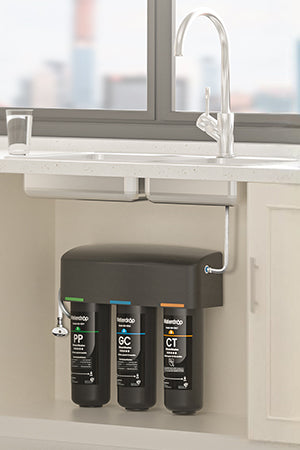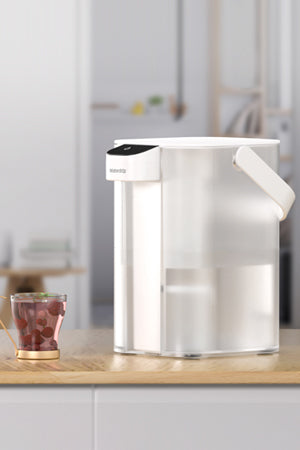In today's world, clean drinking water is essential for good health. However, many people still wonder if it's safe to drink tap water without using a water filter. In countries like Singapore, where tap water is considered safe and is regularly treated to meet stringent health standards, is using a water filter really necessary? The short answer is YES. Let’s find out why.
Should You Drink Tap Water in Singapore?
Singapore's drinking water is among the purest in the world. Precautions are thoroughly taken by
the Singapore Public Utilities Board (PUB) to ensure the water supply is up to international standards. Local reservoir water is purified with highly advanced procedures involving reverse osmosis (RO), ultraviolet (UV) disinfection, and chlorine treatment to eliminate dangerous impurities and microorganisms.
Why is Singapore's Tap Water Safe?
Stringent Filtration and Treatment: Tap water in Singapore passes through several stages of filtration, ranging from the primary collection in reservoirs to sophisticated treatment plants. PUB ensures the water does not contain any pathogens, dangerous chemicals, or contaminants.
Regular Testing: PUB regularly tests its water supply to ensure safety standards. Water is also continuously checked for contaminants such as bacteria, metals, and chlorine to make it safe for drinking.
Infrastructure Maintenance: Singapore's water infrastructure is well-maintained, and pipes are regularly checked for leaks or contamination. This minimizes the risk of harmful substances entering the water supply.
With the sophisticated treatment procedures implemented, the tap water in Singapore is safe for drinking directly through the tap. There will always be certain risks involved when consuming water with no filter, regardless of conditions for plumbing, quality after the treatment plants, as well as individual preferences.
Why Some People Still Use Water Filters Despite Safe Tap Water
Even though the Singapore tap water is purified and tested, there are several reasons why people choose to install water filters in their homes. These are among the most frequent reasons:
1. Possible Pollutants through Aging Pipes
Even though the city has modernized its plumbing, the old pipes in some parts of the city might still have lead or other impurities. This
corrosion on the old pipes might cause the release of metals such as lead or copper into the water, potentially altering its safety level or flavor. This is something to check, particularly for old buildings or suspect plumbing.
2. Bad Taste and Smell
Others would find the tap water, as safe as it is, non-palatable or has an odor. This could be due to the chlorine, which is applied during the treatment of the water for the reason that the water needs to be disinfected. Chlorine is crucial for the safety of water, but sometimes it will leave a chemical aftertaste disliked by many people.
3. Elimination of Additional Pollutants
While the water treatment techniques employed by Singapore are highly effective, certain micropollutants such as pesticides, drug residues, and heavy metals might still persist. Even though the contaminants would not pose an immediate effect on health, certain individuals opt for reduced intake for the purpose of peace of mind.
4. Improving Water Quality and Health
For those concerned with overall health, installing a
water filter can improve the taste and quality of water by removing various chemicals and substances that may not be harmful but still affect the water’s purity. Filtered water can be a more appealing option for daily hydration, especially for families with young children or those on a wellness journey.
What Are the Risks of Drinking Water Without a Filter?
While tap water in Singapore is treated and monitored for safety, there are still risks associated with drinking unfiltered water in certain situations. Let’s look at some of the potential risks:
1. Long-Term Exposure to Contaminants
Even in a well-regulated system like Singapore’s, trace amounts of certain contaminants could accumulate over time. Heavy metals such as lead, arsenic, and cadmium can sometimes enter the water supply through old plumbing or industrial pollution. Long-term exposure to these contaminants, even at low levels, can have serious health effects, especially on children, pregnant women, and individuals with compromised immune systems.
2. Bacteriological and Viral Cont
While PUB uses advanced UV disinfection to kill bacteria and viruses in the water, the water supply could still potentially be contaminated after it leaves the treatment plants. If water is stored for extended periods, or if plumbing systems are not properly maintained, bacteria, viruses, or fungi could grow and multiply, potentially leading to illness.
3. Inconsistent Water Quality
Water quality can vary from place to place, depending on factors such as local plumbing systems, seasonal changes, or maintenance work. For instance, during certain maintenance activities, the water supply might be disrupted, which could lead to temporary contamination or water turbidity. Drinking unfiltered water during such periods can increase the risk of exposure to harmful substances.
How Can a Water Filter Help Improve Water Safety and Quality?
Using a water filter can significantly enhance the safety and quality of the water you drink. A good water filter can remove a wide range of contaminants that may not be effectively eliminated by standard municipal treatment processes. Here’s how a water filter can help improve your water:
1. Removal of Hazardous Chemicals
Reverse osmosis (RO) or activated carbon filters may eliminate chemicals including chlorine, pesticides, herbicides, and pharmaceutical byproducts that will not always be removed during city treatment. This may notably enhance the safety of the water you drink.
2. Elimination of Heavy Metals
Most water filters, particularly RO systems, successfully filter heavy metals like lead, arsenic, and cadmium, which could seep through aged pipes or polluted groundwater sources. Such metals pose health risks when ingested for extended periods.
3. Taste and Odor Improvement
By removing chlorine, chemicals, and organic compounds, a water filter can improve the taste and odor of water, making it more pleasant to drink. This is particularly beneficial for people who find the taste of tap water unpleasant due to chlorine or other additives.
4. Enhanced Health Benefits
Filtered water is typically cleaner, and using a high-quality water filter ensures that you are drinking water that is free from contaminants that could negatively affect your health. A water filter can also help you hydrate with confidence, knowing that your water is safe and clean.
Conclusion: Is Drinking Water Without a Filter Safe?
Although Singapore tap water is safe for most people to drink, there are still potential dangers to unfiltered water. There could still be contaminants present in the form of heavy metals, chlorine, or bacteria, particularly where the plumbing is outdated or the quality of the water varies.
Finally, for most individuals, filtered water is better-tasting and better for long-term health when it comes to keeping the body hydrated. If you're looking for a simple, effective way to ensure that your drinking water is safe, clean, and tastes great, consider using a Waterdrop water filter.





































































